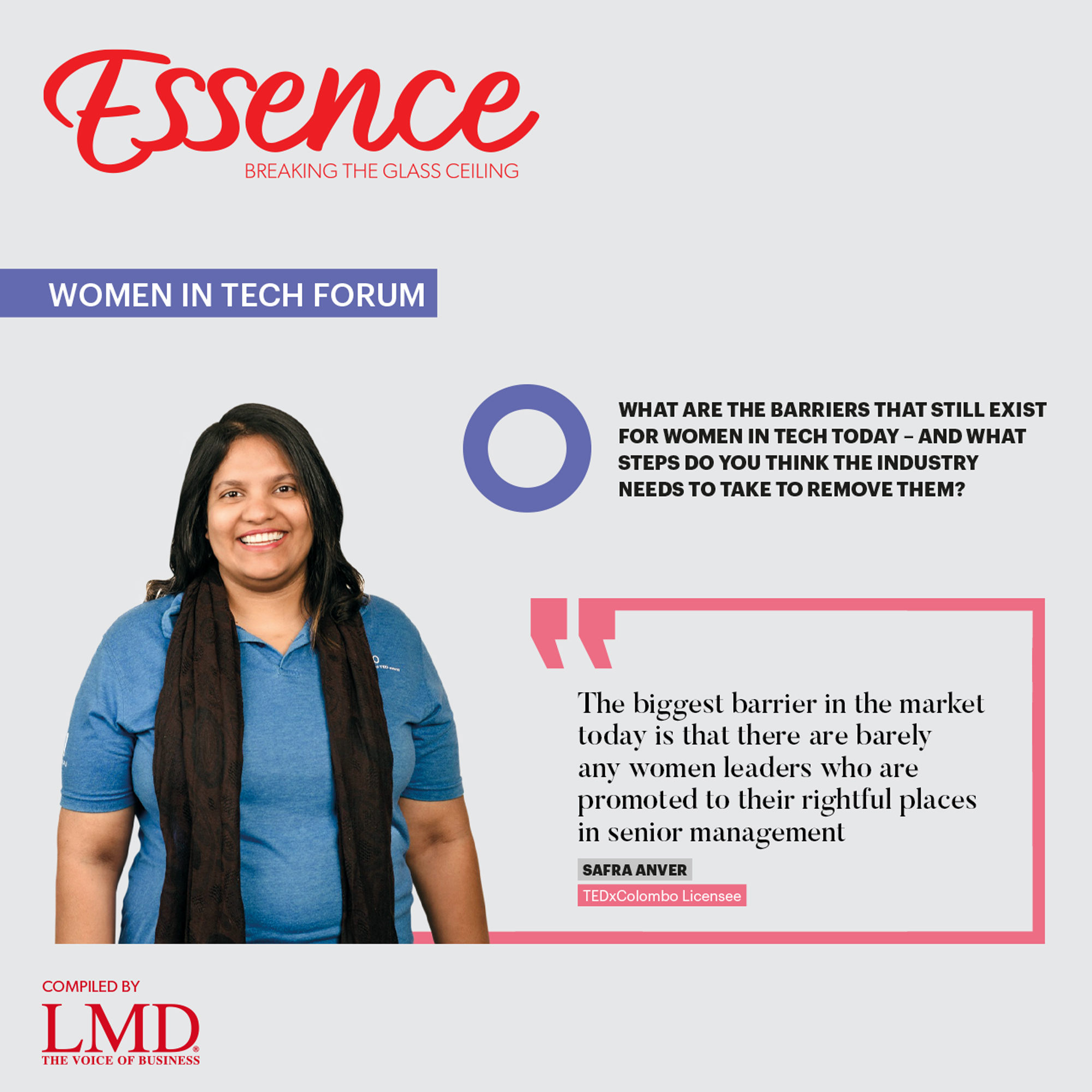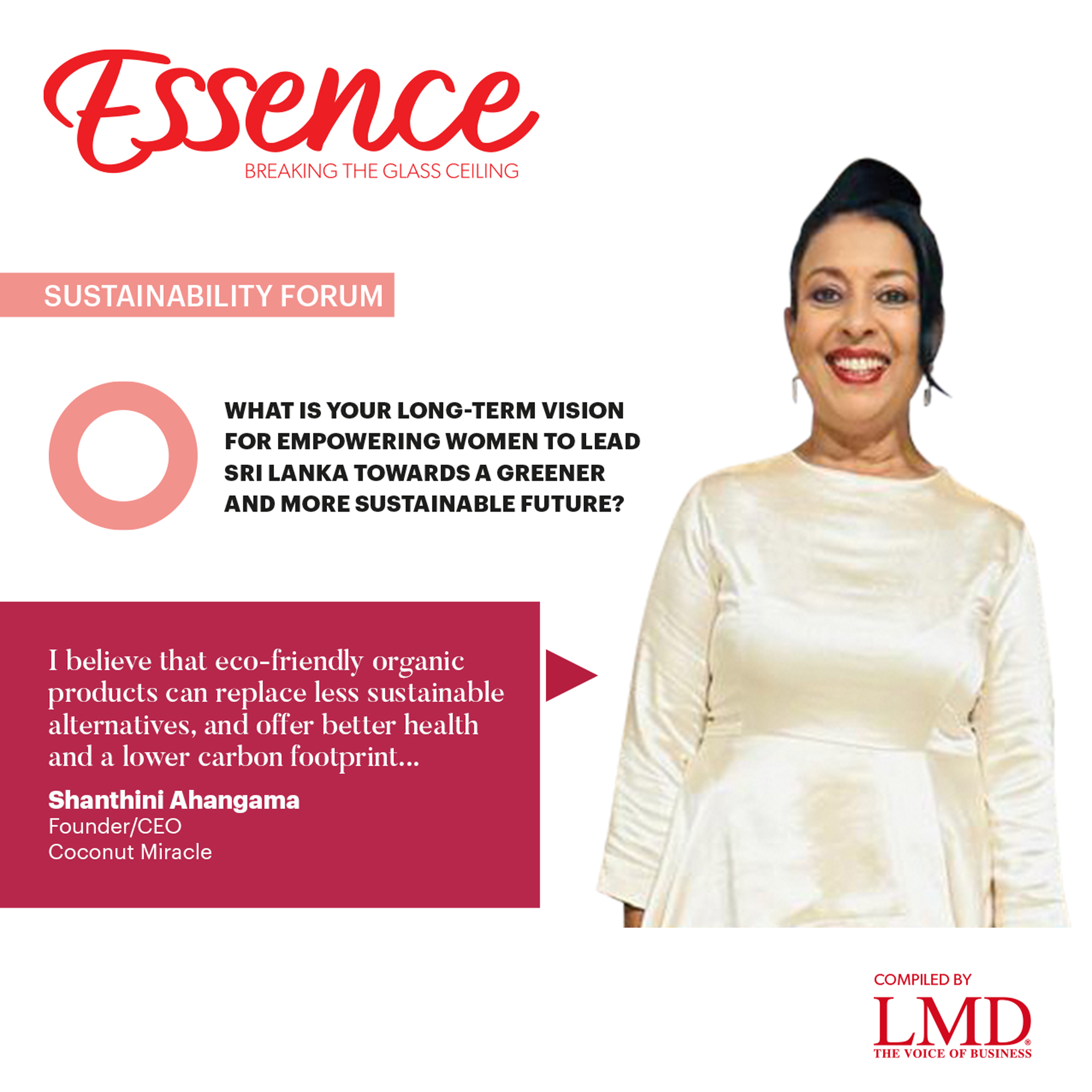Ceylon Tobacco (CTC)

Managing Director
Chief Executive Officer
Q: What does gender equality, and diversity, equity and inclusion (DEI), mean at CTC?
A: CTC approaches this as a key focus area in alignment with our DEI agenda. Diversity at CTC considers the entire spectrum including cognitive. Inclusion is celebrating all differences and giving our people a true sense of belonging to the organisation. Equity ensures everyone at CTC has a fair chance to all offered opportunities.
Holistically, we believe that all three elements of DEI should interplay in a way that best benefits employees with a healthy balance and focus on each.
Q: How is Sri Lanka faring in women’s representation in business?
A: Sri Lanka has made healthy strides with the percentage of women in business increasing over time. There is more potential to be leveraged and it should continue to be endorsement for sustained progress.
While we see the government, nongovernmental organisations and other entities beyond corporates facilitating some opportunities, and promoting this agenda, we need to accelerate and intensify focus to gain significant traction.
Q: Apart from traditional ways of supporting working women, what are businesses doing to help women maximise their potential?
A: At CTC, we coach women from early in their careers to support a seamless transition as they prioritise both personal and professional commitments. It’s also important to see beyond traditional roles, and support the empowerment of young aspiring women to become more confident and focused on their personal development.
Networking, facilitating mobility and making them ambassadors are also areas we can support women in – not only for their own potential but also, to drive the broader agenda of diversity. Men engaging and endorsing these efforts is also a key, and I believe that businesses have potential to do more in this space.
“Going beyond sharing knowledge and experience, mentors must also provide a platform for other women to build their networks and give them visibility
Q: In what ways have new working norms contributed to encouraging more women to join the workforce in Sri Lanka? What needs to be done to sustain this trend?
A: New working norms have impacted some parts of the workforce but there is still a long way to go. More companies need to offer flexible hours and working styles, sufficient maternity and paternity leave, and support through internal groups – to name a few.
These contribute to encouraging women to join the workforce, as well as retaining them. Companies should not be deterred by setbacks in their journey but instead focus on the long-term outcomes over short-term wins.
Q: How important is mentorship to groom and encourage more women leaders?
A: Mentorship and coaching are important focus areas at CTC. Going beyond sharing knowledge and experience, mentors must also provide a platform for other women to build their networks and give them visibility.
Sharing experiences and developing professional growth plans are also areas where mentorship can play a vital role. Good mentors should be able to develop and support women to be confident and ambitious in their professional journeys.
Q: What sets female entrepreneurs apart? And what needs to be done to encourage more of them?
A: Females tend to be more collaborative and are known to take calculated risks, which is beneficial when running a business. However, female entrepreneurs require more grit and resilience to succeed in an environment that is not necessarily built for them. The dynamics are improving but continued focus and effort are essential.
Q: What is your vision for businesswomen in Sri Lanka?
A: A few focus areas include: women having equal opportunities to set up businesses in Sri Lanka – on an equal footing, and supported by the government, society and their families; businesswomen being active advocates of the DEI agenda; facilitation of early education to pursue unconventional business fields; and supporting any ambition to pursue business opportunities beyond Sri Lanka.
While these are many ways of envisioning the future for businesswomen, it’s critical that we bridge the gaps now, and accelerate empowerment to drive tangible change for all women.

Head of Human Resources
Q: At CTC, what do gender equality, and diversity, equity and inclusion (DEI) mean?
A: At CTC, equity ensures that our employees are given equal opportunities to pursue career advancement, development and wellbeing, irrespective of their background.
Our continuous efforts include creating awareness on the importance of DEI, ensuring leadership endorsement, driving an environment that promotes psychological safety for our employees and ensuring that it is deeply embedded into our culture.
Q: In terms of women’s representation in business, how is Sri Lanka faring?
A: Today, you see more awareness around DEI than before. There is certainly more to do in this vital space – stemming from board level downwards across all industries – but it’s important to acknowledge that there is progress.
At CTC as well, we are proud to have a female at the helm as our Managing Director and Chief Executive Officer.
However, the focus on promoting female representation in business must be bolstered at national, as well as organisational, levels – as driving this agenda must address society’s expectations of the traditional responsibilities of women.
Q: What are the most pressing challenges for women in the workplace today?
A: The transition from mid-career upwards is where women often find it challenging. It’s important to support them through coaching and mentoring to facilitate a smooth transition to senior roles.
Balancing both work and personal lives also continues to be another pressing challenge for women in the workplace, followed by the lack of enabling conditions from an organisation in terms of support and timely interventions to manage their many commitments.
“Female representation across corporate boards is now a necessity – we have made significant progress in Sri Lanka, and the benefits can be seen across businesses
Q: And how can these be overcome?
A: At CTC, we offer flexible modes of working as well as ‘flexi’ hours. Our strong female network also frequently conducts knowledge and experience sharing programmes that focus on holistic – including physical, mental, social and financial – wellbeing.
Empowering through customised personal and professional development coaching to meet women’s individual needs should also be prioritised across organisations.
Q: How well have Sri Lankan corporate boards adopted inclusion and diversity – especially regarding female representation?
A: Female representation across corporate boards is now a necessity. We have made significant progress in Sri Lanka, and the benefits can be seen across businesses that have openly adopted inclusion and diversity. This helps set the platform for other organisations to emulate and adapt accordingly.
While inclusion and diversity were previously seen as good to have in a business, the focus is now more concrete, and tangible results can be seen and measured.
Q: And how important is mentorship to groom and encourage more women leaders?
A: Mentorship is vital. It paves the way for psychological safety, offers a platform to better navigate one’s career through another’s experience, provides sponsors and allies for the journey, and enables networking opportunities.
Q: How should women in business maintain a healthy work-life balance?
A: Understanding what works for you is the key. Having the right conversations with the correct stakeholders in this process also helps establish your priorities and boundaries.
Where there may be challenges in prioritising, approach innovative ways of getting the support you need through development interventions or alternative options that allow you to balance your commitments. The organisation too plays a key role in facilitating this balance.
Q: What can organisations do to address the loss of women employees at mid-career?
A: Businesses can look at supporting childcare, offer flexible work and hours, and explore other policies that would benefit women. Women often face the challenge of returning to work from maternity leave (a significant transition period) where organisations can explore interventions and initiatives to ease the process.
Transitions from mid to senior levels also require a development scope that includes personality development and strategic thinking capabilities, which can be proactively addressed earlier.
Planning and preparing ahead to manage your workforce is critical for organisations now, more than ever before. It’s equally important to sustain the conversation on the importance of DEI and its benefits for the organisation, as well as its people.
Q: What does gender equality, and diversity, equity and inclusion (DEI), mean at CTC?
A: CTC approaches this as a key focus area in alignment with our DEI agenda. Diversity at CTC considers the entire spectrum including cognitive. Inclusion is celebrating all differences and giving our people a true sense of belonging to the organisation. Equity ensures everyone at CTC has a fair chance to all offered opportunities.
Holistically, we believe that all three elements of DEI should interplay in a way that best benefits employees with a healthy balance and focus on each.
Q: How is Sri Lanka faring in women’s representation in business?
A: Sri Lanka has made healthy strides with the percentage of women in business increasing over time. There is more potential to be leveraged and it should continue to be endorsement for sustained progress.
While we see the government, nongovernmental organisations and other entities beyond corporates facilitating some opportunities, and promoting this agenda, we need to accelerate and intensify focus to gain significant traction.
Q: Apart from traditional ways of supporting working women, what are businesses doing to help women maximise their potential?
A: At CTC, we coach women from early in their careers to support a seamless transition as they prioritise both personal and professional commitments. It’s also important to see beyond traditional roles, and support the empowerment of young aspiring women to become more confident and focused on their personal development.
Networking, facilitating mobility and making them ambassadors are also areas we can support women in – not only for their own potential but also, to drive the broader agenda of diversity. Men engaging and endorsing these efforts is also a key, and I believe that businesses have potential to do more in this space.
Q: In what ways have new working norms contributed to encouraging more women to join the workforce in Sri Lanka? What needs to be done to sustain this trend?
A: New working norms have impacted some parts of the workforce but there is still a long way to go. More companies need to offer flexible hours and working styles, sufficient maternity and paternity leave, and support through internal groups – to name a few.
These contribute to encouraging women to join the workforce, as well as retaining them. Companies should not be deterred by setbacks in their journey but instead focus on the long-term outcomes over short-term wins.
Q: How important is mentorship to groom and encourage more women leaders?
A: Mentorship and coaching are important focus areas at CTC. Going beyond sharing knowledge and experience, mentors must also provide a platform for other women to build their networks and give them visibility.
Sharing experiences and developing professional growth plans are also areas where mentorship can play a vital role. Good mentors should be able to develop and support women to be confident and ambitious in their professional journeys.
Q: What sets female entrepreneurs apart? And what needs to be done to encourage more of them?
A: Females tend to be more collaborative and are known to take calculated risks, which is beneficial when running a business. However, female entrepreneurs require more grit and resilience to succeed in an environment that is not necessarily built for them. The dynamics are improving but continued focus and effort are essential.
Q: What is your vision for businesswomen in Sri Lanka?
A: A few focus areas include: women having equal opportunities to set up businesses in Sri Lanka – on an equal footing, and supported by the government, society and their families; businesswomen being active advocates of the DEI agenda; facilitation of early education to pursue unconventional business fields; and supporting any ambition to pursue business opportunities beyond Sri Lanka.
While these are many ways of envisioning the future for businesswomen, it’s critical that we bridge the gaps now, and accelerate empowerment to drive tangible change for all women.
Q: At CTC, what do gender equality, and diversity, equity and inclusion (DEI) mean?
A: At CTC, equity ensures that our employees are given equal opportunities to pursue career advancement, development and wellbeing, irrespective of their background.
Our continuous efforts include creating awareness on the importance of DEI, ensuring leadership endorsement, driving an environment that promotes psychological safety for our employees and ensuring that it is deeply embedded into our culture.
Q: In terms of women’s representation in business, how is Sri Lanka faring?
A: Today, you see more awareness around DEI than before. There is certainly more to do in this vital space – stemming from board level downwards across all industries – but it’s important to acknowledge that there is progress.
At CTC as well, we are proud to have a female at the helm as our Managing Director and Chief Executive Officer.
However, the focus on promoting female representation in business must be bolstered at national, as well as organisational, levels – as driving this agenda must address society’s expectations of the traditional responsibilities of women.
Q: What are the most pressing challenges for women in the workplace today?
A: The transition from mid-career upwards is where women often find it challenging. It’s important to support them through coaching and mentoring to facilitate a smooth transition to senior roles.
Balancing both work and personal lives also continues to be another pressing challenge for women in the workplace, followed by the lack of enabling conditions from an organisation in terms of support and timely interventions to manage their many commitments.
Q: And how can these be overcome?
A: At CTC, we offer flexible modes of working as well as ‘flexi’ hours. Our strong female network also frequently conducts knowledge and experience sharing programmes that focus on holistic – including physical, mental, social and financial – wellbeing.
Empowering through customised personal and professional development coaching to meet women’s individual needs should also be prioritised across organisations.
Q: How well have Sri Lankan corporate boards adopted inclusion and diversity – especially regarding female representation?
A: Female representation across corporate boards is now a necessity. We have made significant progress in Sri Lanka, and the benefits can be seen across businesses that have openly adopted inclusion and diversity. This helps set the platform for other organisations to emulate and adapt accordingly.
While inclusion and diversity were previously seen as good to have in a business, the focus is now more concrete, and tangible results can be seen and measured.
Q: And how important is mentorship to groom and encourage more women leaders?
A: Mentorship is vital. It paves the way for psychological safety, offers a platform to better navigate one’s career through another’s experience, provides sponsors and allies for the journey, and enables networking opportunities.
Q: How should women in business maintain a healthy work-life balance?
A: Understanding what works for you is the key. Having the right conversations with the correct stakeholders in this process also helps establish your priorities and boundaries.
Where there may be challenges in prioritising, approach innovative ways of getting the support you need through development interventions or alternative options that allow you to balance your commitments. The organisation too plays a key role in facilitating this balance.
Q: What can organisations do to address the loss of women employees at mid-career?
A: Businesses can look at supporting childcare, offer flexible work and hours, and explore other policies that would benefit women. Women often face the challenge of returning to work from maternity leave (a significant transition period) where organisations can explore interventions and initiatives to ease the process.
Transitions from mid to senior levels also require a development scope that includes personality development and strategic thinking capabilities, which can be proactively addressed earlier.
Planning and preparing ahead to manage your workforce is critical for organisations now, more than ever before. It’s equally important to sustain the conversation on the importance of DEI and its benefits for the organisation, as well as its people.
Telephone 2496200
Email Contact_CTC@bat.com
Website www.ceylontobaccocompany.com








